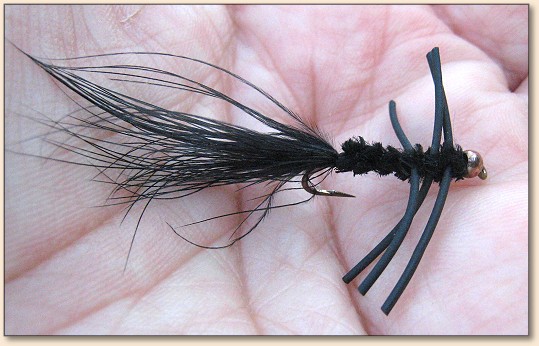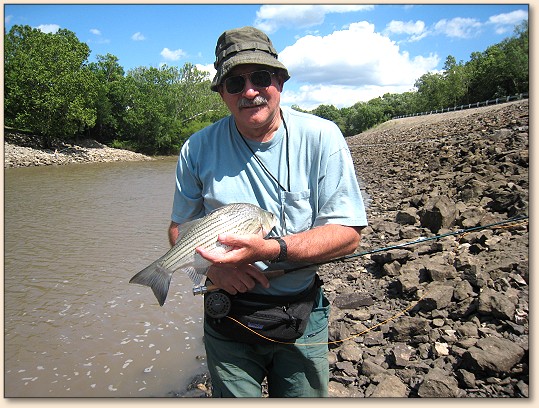|
The whole thing looked like a waste of time. Too many people
had beaten me here. Too many bait fishermen were sitting on
the bank staring out at their bobbers; too many lure fishermen
were casting mechanically, one throw after another, with no
body language indicating that anything exciting was happening.
Then my eye was caught by the unmistakable throbbing bend in a
spinning rod, a rod held by a lure fisherman who had waded halfway
across the outlet riffle. He had something good on, his rod was
bent deeply. Finally, he reached down and lifted from the water
a long, silver-sided fish.
I was too far off to see what species it was. Not only that, I
didn't care what species it was: if something that long with
silver sides just got caught, it's possible more such unknown
fish are hitting, and chances are they could be large crappies.
Big crappies were certainly a possibility here. A large-volume
(5,000 cfs) release from the lake had been cut back to 100 cfs
just two days earlier. In such circumstances, where fish have
been getting flushed out of the lake for days while, simultaneously,
river-dwelling fish in the stream below the dam have been migrating
upcurrent to see what all the fuss is about, you have a situation
where virtually every gamefish species in Kansas could be swimming
in this now-reduced outlet pool.
Adjacent to the arc of excellent water immediately downstream from
where stood the wading fisherman there are two good-looking spots.
One was already taken by a bobber fisherman. The other, the one on
my side of the pool, was occupied, too. But just as I began to voice
disappointment about this, the guy who was fishing it abandoned the
spot. Instead of moving directly to it, I eased down the rocky
slope and took up a position about 50 feet downstream.
After about twenty casts using a Pheasant Tail Nymph of small size,
I began thinking that the extremely muddy water coming out of the
lake might be making it difficult if not impossible for the fish
to detect a PTN. Or not. But I was excited, and twenty casts
just seemed like a lifetime to go without a hit. Especially after
seeing that guy in the riffle catch a good fish.
Looking through my little fly boxes, I picked out one of the flies
Rick Zieger sent me after my stuff got stolen last month. This
all-black marabou-tailed bugger with rubber legs looked like just
what the doctor ordered in this dingy water.

Into the pool it went. Not along the bank or into the riffle-disturbed
water, but farther down in somewhat calmer water. A few casts later
it got grabbed hard by a fish that commenced making a series of
drag-strip runs, one of which took my floating line clear across
the stilling pool, where it angled down into the water almost at
the feet of the bobber fisherman who was sitting opposite me.
Like a dummy, I'd forgotten to bring my landing net; it was back
up in the bed of my truck, doing me no good at all there. As the
fight wore on, I realized this would be one of those deals where
I'd have to work the fish in against the rocks then somehow pin
it there and land it by hand. Not the best way to do business
with a fish this strong, that's for sure.
After making multiple runs across the pool and, times when it was
close, resisting my attempts to bring it shallow enough that I
could see what kind of fish it was, finally I caught a glimpse
and was pleasantly startled to see a white bass/striped bass
hybrid, or "wiper," with Rick's black bugger in its mouth.
Once I got the fish against the rocks it repeatedly shook loose
from my attempts to "lip" it from the water. This forced me to
scoop the fish sideways against the rocks. By sheer chance I
lifted the fish into the air after slipping my hand underneath
its belly. To my great surprise and relief the fish went totally
inert. I could only hope that this lifting technique didn't damage
its internal organs, as my intent was to release it (which I did,
even though it measured long enough to be a legal keeper).

Moments after releasing this wiper I heard the wading fisherman
call to me, asking what I'd used to catch the fish. I walked
over closer, asked him to hold his spinning rod straight out
horizontal in front of himself. I then laid a cast across his
rod and told him to pull my line in and check out Rick's fly.
"That's unbelievable," he said, upon inspecting the fly. "I told
my Grandpa over there (gesturing toward the older guy sitting on
the bank watching his bobber) that when we saw you walk down to
the water with a fly rod that here was a guy who was going to
show us how it's done."
"Well, thanks. You should give fly rodding a try sometime; it
works really good," I told him. "But hey, man, if you hadn't shown
ME how it's done by catching that big fish you caught about 30
minutes ago, I never would have put a cast in the water today.
What was that fish you caught, by the way?"
"It was a wiper, too. They're really in here thick after they
(the Corps) cut off the water."
We'd no sooner finished this brief conversation than Grandpa got
a hit on his bobber-suspended minnow. The wading fisherman
returned to the bank, pulled a digital camcorder out of his pack
and filmed the entire fight. Grandpa's fish turned out to be yet
another wiper, a big one that fought with the characteristic
stubborn struggle interspersed with lightning bolt runs across
the pool.
I had to smile at how cool this was: one guy catches a wiper on
a curly-tail rubber jig, I catch one on a black woolly bugger
and a third man catches one on a minnow.
Wipers sure do know how to spread the fun around. ~ Joe
About Joe:
 From Douglas County, Kansas, Joe is a former municipal and
federal police officer, now retired. In addition to fishing, he hunts
upland birds and waterfowl, and for the last 15 years
has pursued the sport of solo canoeing. On the nearby
Kansas River he has now logged nearly 5,000 river miles
while doing some 400 wilderness style canoe camping
trips. A musician/singer/songwriter as well, Joe recently
retired from the U.S. General Services Adminstration.
From Douglas County, Kansas, Joe is a former municipal and
federal police officer, now retired. In addition to fishing, he hunts
upland birds and waterfowl, and for the last 15 years
has pursued the sport of solo canoeing. On the nearby
Kansas River he has now logged nearly 5,000 river miles
while doing some 400 wilderness style canoe camping
trips. A musician/singer/songwriter as well, Joe recently
retired from the U.S. General Services Adminstration.
Joe at one time was a freelance photojournalist who wrote the
Sunday Outdoors column for his city newspaper. Outdoor
sports, writing and music have never earned him any money,
but remain priceless activities essential to surviving the
former 'day job.'
|



 From Douglas County, Kansas, Joe is a former municipal and
federal police officer, now retired. In addition to fishing, he hunts
upland birds and waterfowl, and for the last 15 years
has pursued the sport of solo canoeing. On the nearby
Kansas River he has now logged nearly 5,000 river miles
while doing some 400 wilderness style canoe camping
trips. A musician/singer/songwriter as well, Joe recently
retired from the U.S. General Services Adminstration.
From Douglas County, Kansas, Joe is a former municipal and
federal police officer, now retired. In addition to fishing, he hunts
upland birds and waterfowl, and for the last 15 years
has pursued the sport of solo canoeing. On the nearby
Kansas River he has now logged nearly 5,000 river miles
while doing some 400 wilderness style canoe camping
trips. A musician/singer/songwriter as well, Joe recently
retired from the U.S. General Services Adminstration.